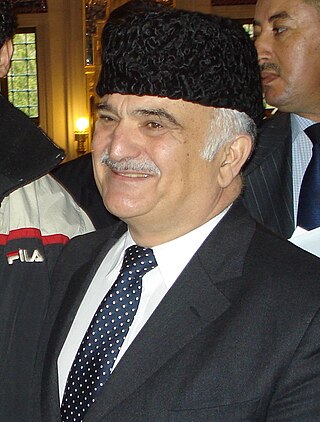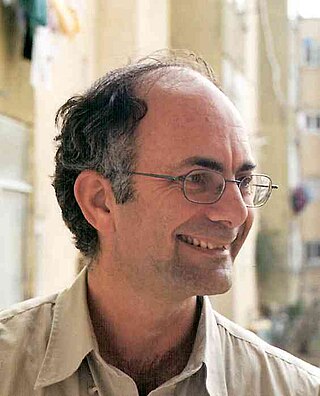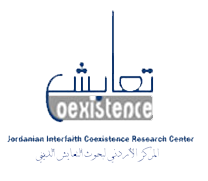
Abdullah II bin Al-Hussein is King of Jordan, having ascended the throne on 7 February 1999. He is a member of the Hashemite dynasty, who have been the reigning royal family of Jordan since 1921, and is considered a 41st-generation direct descendant of the Islamic prophet Muhammad.

Interfaith dialogue refers to cooperative, constructive, and positive interaction between people of different religious traditions and/or spiritual or humanistic beliefs, at both the individual and institutional levels.

Adel Al-Jubeir is a Saudi diplomat who is the Minister of State for Foreign Affairs. He is the second person not belonging to the House of Saud to hold the office, after Ibrahim bin Abdullah Al Suwaiyel. He previously served as the Saudi Ambassador to the United States from 2007 to 2015, and was also a foreign policy advisor to King Abdullah.

Prince El Hassan bin Talal is a member of the Jordanian royal family who was previously Crown Prince from 1965 to 1999, being removed just three weeks before King Hussein's death. He is now 20th in line to succeed his nephew King Abdullah II.

Hussein bin Abdullah is Crown Prince of Jordan as the eldest son of King Abdullah II and Queen Rania. He is a member of the Hashemite dynasty, the royal family of Jordan since 1921, and is considered to be 42nd-generation direct descendant of the Islamic prophet Muhammad.
The Amman Message is a statement calling for tolerance and unity in the Muslim world that was issued on 9 November 2004 by King Abdullah II bin Al-Hussein of Jordan, and his advisor Sheikh Izz-Eddine Al-Tamimi. The message aims to "clarify to the modern world the true nature of Islam and the nature of true Islam," and to specify which actions do and do not represent the religion.

Yehuda Stolov, an Israeli, is a founder and the executive director of the Interfaith Encounter Association (IEA). He currently resides in Jerusalem with his wife, Lia and his three kids.
"A Common Word between Us and You" is an open letter, from October 13, 2007, from Muslim to Christian leaders. It calls for peace between Muslims and Christians and tries to work for common ground and understanding between both religions, in line with the Qur'anic command: "Say: 'O People of the Scripture! come to a common word as between us and you: that we worship none but God" and the Biblical commandment to love God, and one's neighbour. In 2008, the initiative was awarded the Eugen Biser Award, and the Building Bridges Award from the UK's Association of Muslim Social Scientists.

Prince Ghazi bin Muhammad is a Jordanian prince and a professor of philosophy. He is the son of Prince Muhammad bin Talal of Jordan and his first wife, Princess Firyal. He is a grandson of King Talal of Jordan and thus a first cousin of King Abdullah II and sixteenth in the line of succession to the Jordanian throne. He is well known for his religious initiatives, about which a book was published in 2013.

Abdullah bin Abdulaziz Al Saud was King and Prime Minister of Saudi Arabia from 1 August 2005 until his death in 2015. Prior to his ascension, he was Crown Prince of Saudi Arabia since 13 June 1982. He was the tenth son of King Abdulaziz, the founder of Saudi Arabia.
C1 World Dialogue is an initiative, whose stated mission is to “support and promote, propagate and preserve, peace harmony and friendship between the Western and Islamic Worlds”. The initiative has its origins in the Council of One Hundred Leaders (C-100) West-Islamic Dialogue originally launched by the World Economic Forum in response to the attacks of 11 September 2001 on the USA. Since then, the group has evolved into an autonomous body with an institutional base as a Swiss foundation, based in Basel. The president of the General Conference of the organization is former British Prime Minister Tony Blair.

The Jordanian Interfaith Coexistence Research Center is a non-governmental organization for promoting peaceful religious coexistence based out of Amman, Jordan. It focuses on fostering interfaith dialogue on a grassroots level and creating interreligious harmony. The JICRC is currently run by its founder and director, Father Nabil Haddad.
James Wuye is a Pastor of the General Council of the Assemblies of God Nigeria and co-director with Imam Muhammad Ashafa of the Interfaith Mediation Center of the Muslim-Christian Dialogue in Kaduna, Kaduna State, Northern Nigeria.

Muhammad bin Abdul Karim Issa is a Saudi Arabian religious leader, Secretary General of the Muslim World League, President of the International Islamic Halal Organization, and former Saudi Minister of Justice.

The King Abdullah bin Abdulaziz International Centre for Interreligious and Intercultural Dialogue, mostly referred to as "The International Dialogue Centre – KAICIID" and globally known by its abbreviation, KAICIID, is an inter-governmental organization that promotes interreligious and intercultural dialogue to prevent and resolve conflict. It was established in Vienna, Austria, but relocated to Lisbon, Portugal on 1 July 2022.
The Common Ground between Islam and Buddhism project is an interfaith initiative originated by the Dalai Lama and Prince Ghazi bin Muhammad of Jordan. These two were joined by a panel of select scholars, and the project was officially launched on May 12, 2010, in Bloomington, Indiana, US. The project is based on the book Common Ground between Islam and Buddhism, by Reza Shah-Kazemi, who together with Ingrid Mattson and Eboo Patel was part of the scholars’ panel convened for the Bloomington event.

Sayyid Ibraheem Khaleel Al Bukhari is founder and chairman of Ma'din Academy and adviser of World Interfaith Harmony Week. He is a sunni Islamic scholar, Joint Secretary of Samastha Kerala Jamiyyathul Ulama, General Secretary of Kerala Muslim Jamaat, a body of various Muslim organizations in Kerala and he is listed in The Muslim 500.

Faisal bin Abdulrahman bin Muaammar is the founding Secretary General of the King Abdullah bin Abdulaziz International Centre for Interreligious and Intercultural Dialogue and the King Abdulaziz Center for National Dialogue. He is also notable as Supervisor General of the King Abdulaziz Public Library.

The Millennium Peace Summit of Religious and Spiritual Leaders was held in New York City between August 28–31, 2000. The meeting recognized the importance of religion to world peace and faith leaders’ commitment to peacekeeping, poverty relief, and environmental conservation. It preceded the Millennium Summit, which commemorated the 50th anniversary of the United Nations (UN).














